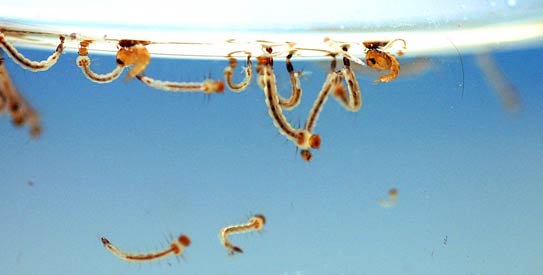
KARACHI: The recent outbreak of dengue fever confirmed the presence of all four types of dengue viral infections in Pakistan. Experts also warned that dengue could spread severely throughout the country as it has in the province of Punjab.
This was stated by Dr. Javed Akram, the Head of Jinnah Hospital Lahore and chairman of dengue expert committee. Until date, officially more than 3,500 people have been infected and over a dozen have died from the recent dengue outbreak in Pakistan.
“These are the official figures but I think the number of unreported dengue patients is more than 500, 000,”Akram told Dawn.com.
Akram said that in the past they had warned the authorities about the worst possible outbreak of dengue fever in Pakistan but this time they seemed to have been too late. Next year, the epidemic will be even more catastrophic than it has been now, he added.
Akram, along with others contributed a research paper about the 2008 dengue outbreak study in two hospitals of Lahore. The paper was published in 2009 in the International Journal of Infectious Disease.
An estimated 100 million persons worldwide get infected with dengue annually, a resurging viral infection spread by the mosquito Aedes aegyptii. In Pakistan Aedes aegyptii is mainly responsible for this disease.
Several hundred thousands of patients develop dengue hemorrhagic fever (DHF) — a more severe, usually fatal form in which bleeding and shock occurs.
A study of two outbreaks in Lahore in 2008, conducted on 110 patients from two hospitals, showed more than half of them had developed the more severe form which is now confirmed by the current dengue outbreak in Punjab.
Malik Asif Humayoun, then the head of the department of medicine at Allama Iqbal Medical College and the Jinnah Hospital, and his colleagues describe this increase in the more severe form as compared to previous years as alarming.
Four strains of the dengue virus circulate worldwide, including South Asia, and the fatal DHF form occurs when a previously infected and cured dengue patient gets re-infected again, usually with a different strain of the virus.
Two of these were reported in previous outbreaks in Karachi city, while a third has been reported in the Lahore outbreak of 2008. Now all four types of dengue serotypes have been confirmed in Punjab.
"There is urgent need to have a countrywide epidemiological survey for multiple dengue serotypes (strains)," said Humayoun.
There is also a need for larger clinical studies in Pakistan and other South Asian countries to better understand the range of infections, endemic patterns and genetic susceptibility of different populations to the dengue virus, the researchers concluded.
Integrated Dengue Control
Dr. Akram stressed the need of an integrated vector control strategy. He said that mosquito sprays are not sufficient as we need a multiple approach for mosquito eradication, such as biological control, Larvicide, mass awareness, quarantine for patients and travel advisory.

“The dengue mosquito larva could survive for more than a year even in a dry place,” Akram added.
“Public awareness is the only way to prevent dengue fever,” said Syed Salahuddin Qadri
Qadri is an Assistant Professor of Zoology at Jamia Milia Degree College in Karachi and is currently working on a project about dengue mosquito control sponsored by the Pakistan Academy of Sciences.
“Spray does little to control the dengue as the mosquito can be found in flush tanks, around abandoned junk on roofs of houses and even in closed underground tanks,” said Qadri.
Qadri added that the Pakistani media did nothing for mass awareness against dengue fever.
Qadri said that one of his colleagues, Dr Tariq, found that the drained larva of Aedes Aegyptii flourished and even appeared healthier in sewerage water. The mosquito can fly over 100 meters.
Qadri urge people to investigate the mosquito habitat carefully as it is found in water from air conditions, gardens and potted plants. He said that he even found a larva of dengue mosquito in soft drink cap!

Qadri stressed the need of a central dengue control and a monitoring system where physicians from Pakistan immediately reported dengue cases. He also urged on the biological control of the mosquito, for instance a small fish Guppy eats the larvae of dengue mosquito.












































